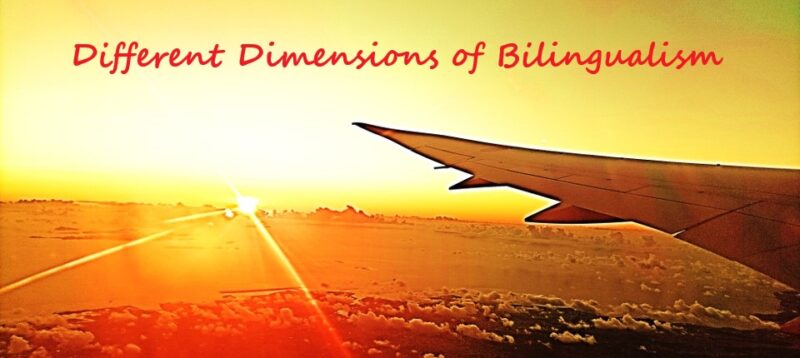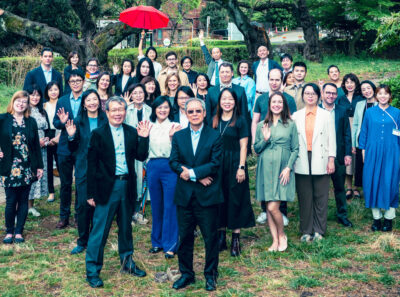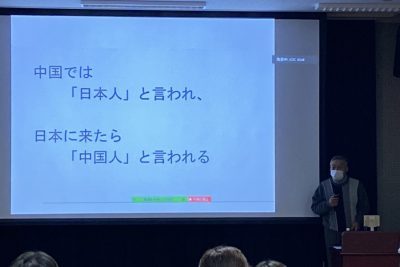UTokyo Class on Bilingualism (Part 1. of 2)

This blog post was created as part of the interdisciplinary zengaku seminar "Different Dimensions of Bilingualism" offered at the University of Tokyo during the 2024 academic year.
Dr. Lidiya SHAMOVA(Instructor, JSPS Postdoctoral Fellow, Tokyo College)
【Course Abstract】What means to be bilingual in a globalizing world? Where bilingualism meets culture, medicine, music, education, and business?
This course aims to present bilingualism from different points of view, focusing on the idea of interdisciplinarity between linguistics and other sciences. It discusses the world's transition from assimilation to multiculturalism and reveals the main definitions of bilingualism, diglossia, and multilingualism. Cases from Japan and Europe illustrate the differences between three different bilingual-bicultural societies. One of the lectures focuses on the changes in the bilingual human brain. A separate class with an experimental part explains the connections between bilingualism and communication through music as a base for innovative research. The participants have the opportunity to listen to guest lectures regarding the importance of bilingualism in the field of business communication and to participate in a workshop on the methods used to teach the Japanese language in a multilingual environment. At the end of the course is held a workshop on conducting a multilingual anonymous survey and writing a scientific text.
===
"Language Attrition Among Bilinguals" by Hiroki TSUDA (Undergraduate student, The University of Tokyo)
Much attention is given to how to master a new language, but there is also a substantial amount of research on how we forget learned languages.
The author of this research was born in a Japanese family and learned English in France during his childhood. By the age of 15, he was fluent in English, French, and Japanese. However, upon returning to Japan at 16, he was immersed in a purely Japanese environment. Since then, his proficiency in English and particularly in French has declined over time. This coincides with a research study that suggests that the more frequently we use a language, the less likely we are to forget it (Fukazawa, 1984, 100).
The bilingual brain is like a machine that can change modes in between languages. We cannot think in two languages at the same time, but we can seamlessly switch from one language to another.
Hope Wilson from Duolingo points out that scientific studies indicate we are prone to forgetting languages, even our native tongue (Wilson, 2024). However, this tendency decreases for individuals with high proficiency levels or those who have had a bilingual education. These findings resonate with the author’s personal experiences. He firmly believes this is a matter of concern for many bilingual individuals, and hopes that more attention will be given to the process of relearning languages that have been gradually lost due to a decline in use.
References:
Wilson, H. (2024) Dear Duolinguo: Can you forget your first language?. Duolinguo. February 20, 2024. https://blog.duolingo.com/can-you-forget-your-first-language/. Accessed on July 1st 2024.
Fukazawa, S. (1984) An Analysis of Forgetting : Theory and Practice of Language Loss. CASELE research bulletin. August 1st 1984. https://ir.lib.hiroshima-u.ac.jp/00033307. Accessed on July 7th 2024.
Pralovska, S. (2018) Is it possible to forget your native language?. Lexika. 12 November 2018. https://www.lexika-translations.com/blog/is-it-possible-to-forget-your-native-language/. Accessed on July 7th 2024.
===
"Bilingual education for Korean ethnic minorities in China" by Jiarui Song (Undergraduate student, The University of Tokyo)
China is a diverse nation comprised of 56 ethnic groups, with the Han constituting about 92% of the population and leaving the remaining 8% as ethnic minorities. China's language education emphasizes the right of ethnic minorities to use their own languages (Anaytulla 2009, 17). Bilingual education in China's minority regions focuses on language instruction, specialized curricula, cultural preservation, and government backing (Ishiguro 2023, 32).
Bilingual education for ethnic minorities includes groups with rich literary traditions such as Mongolian, Tibetan, Korean, Uighur, Kazakh, and others (Shoji 2003, 695). For example, the Korean language education in Yanbian Korean Autonomous Prefecture since the late 1990s’ economic growth has widened social disparities and intensified competition, resulting in increased emphasis on Mandarin Chinese and decreased attention to Korean language education. Nevertheless, with declining birth rates, there has been a renewed recognition of the importance of Korean language education, leading to research on dual-language instruction in Korean and Chinese since 2006. Korean language textbooks in Yanbian Korean Autonomous Prefecture integrate reading comprehension, listening comprehension, speaking, and writing to promote comprehensive learning. Recent revisions have specifically emphasized reading comprehension and writing skills (Ishiguro 2023, 32).
The educational resources for Korean education are insufficient, evidenced by the scarcity of teaching materials and a severe lack of extracurricular reading materials. Only 4,000 out of 120,000 books in Xinhua Bookstore are in Korean, comprising just 3.3% of the total. At the same time, Dual-language teaching in Korean schools has led to a curriculum imbalance, favoring humanities over science and engineering, resulting in low enrollment rates in these fields. Moreover, there are disparities in school resources exacerbated by an aging teaching workforce, with 45% of teachers aged 46 or above (Research report, 2016). Therefore, adjusting the school curriculum and education resources of China according to the minorities’ linguistic situation is necessary. While enriching bilingual education and protecting the Korean ethnic language and culture, adjustments to the school curriculum and education resources are also required.
References:
Anaytulla, G. (2009) Research on bilingual education for ethnic minorities in China: Perspectives on multilingual coexistence.中国における少数民族双語教育に関する研究--多言語共生の視点から。 飛梅論集: 九州大学大学院教育学コース院生論文集 / 九州大学大学院人間環境学府教育システム専攻教育学コース 編 (9), 福岡 : 九州大学大学院人間環境学府教育システム専攻教育学コース。p.17-32. https://ndlsearch.ndl.go.jp/books/R000000004-I10323421 Accessed: 08-07-2024
Ishiguro, M., Kusakabe, R., & Li, X. (2023). Examination of mother tongue and ethnic language textbooks in school education for ethnic minorities in China.
Reddit (2020). Chinese textbooks prepared by Yanbian Education Press used by Korean primary schools in China. 中国继内蒙古之后也缩小朝鲜族民族语言教育. Retrieved June 26, 2024, from https://www.reddit.com/r/4832/comments/it1j9d/中国继内蒙古之后也缩小朝鲜族民族语言教育/?utm_source=share&utm_medium=web3x&utm_name=web3xcss&utm_term=1&utm_content=share_button Accessed: 08-07-2024
Research report (2016) Research report on the education situation of the Korean ethnic minority in Quanzhou [关于全州朝鲜族教育情况的调研报告]. (2016,10,11). Yanbian Renda [延边人大]. http://www.ybrd.gov.cn/ybrd/16dsq1/2016-10-11/173766.html Accessed: 08-07-2024
Shoji, H. (2003). New phases in Chinese minority language policies: Especially in relation to the promotion of Mandarin Chinese. Bulletin of the National Museum of Ethnology, 27(4), p. 683-724.
===
"Music for Language Study" by L.H. (Undergraduate student, The University of Tokyo)
Now there is a lot of evidence about the connection between music and language skills. Several studies demonstrate the positive influence of music in language learning.
One research from the University at Buffalo shows that people who have musical experience are better at imitating pitch than those who don’t (Gumbini, 2024). Moreover, scientists from the Pontificia Universidad Católica de Chile say that children with musical training received higher scores in achievement tests on attention and working memories (Schlaug, 2020). Evidence in support of the positive influence of music apports research from the University of British Columbia. The scientists claim that high school students who took music courses did better in math, English, and science tests (Lok, 2019). Based on this scientific data, it can be concluded that music has a great influence on cognitive skills.
An English teacher, Masaki Makino, introduced English music in his class for university students with low proficiency in listening skills in English (Makino, 2012). His experiment gave positive results, and the students successfully improved their listening skills.
From the perspective of the personal experience of this article’s author, listening to music has improved her English proficiency in several aspects. English music has been helpful to learn English when there was no previous experience with this language. Repetitively listening to and singing favorite English songs (see fig.1) since an early age increased significantly the number of acquired word and phrases, and contributed to the formation of native-like pronunciation. Nevertheless, song listening, piano lessons and singing experience could be the reason for the author to achieve good pronunciation not only in English but also in other languages.
Thus, music can help people with acquiring the right pitch and improving their listening skills in a new language, as well as with multiple cognitive skills such as better attention and working memory. Music can also stimulate people’s interest in languages. In this way, using music to learn languages might be strongly recommended to make the process more exciting and effective.
===
"Improvement of healthcare and bilingualism" by Miyu Kato (Undergraduate student, The University of Tokyo)
There is a strong tie between healthcare and bilingualism. Bilingualism plays a significant role in maintaining brain functions and can contribute to creating a better health system. Thus, the relationship between bilingualism and healthcare is the theme of this article.
First, bilingual healthcare workers can offer better services for everyone, especially to linguistic minorities. According to Joyce University of Nursing & Health Sciences(Staff, 2022):
“Millions speak a language other than English, and approximately 41 million speak Spanish as their native language in the U.S. Furthermore, bilingual nurses can give culturally appropriate care to patients from diverse backgrounds.”
Thus, bilingual doctors and nurses are needed in the era of multiculturalism. Nowadays, more bilingual doctors and nurses are required in Japan because people who cannot speak Japanese have trouble describing their situation.
Moreover, bilingualism can delay dementia and promote healthy cognitive aging. Considering the limited medical resources in low and middle-income countries, “bilingualism should be positioned as an important and specific public health strategy” (Mendis 2021, 1). It can be concluded that it can help improve several health issues.
In addition, the relationship between bilingualism and mental health is complicated. While bilingualism can be a resource for mental flexibility and creativity, it can also present challenges in enabling living with its multiplicities (Burck, 2004, 314). The language you use can affect your identity and subjectivity.
There are various relationships between healthcare and bilingualism. Nevertheless, bilingualism is of some help in providing better healthcare for the population. Therefore, it is recommended for every human being to make use of bilingualism to achieve better healthcare.
References:
Burck, C. (2004). Living in several languages: implications for therapy. Journal of Family Therapy, 26(4), Blackwell Publishing, Oxford, 314–339. https://doi.org/10.1111/j.1467-6427.2004.00287.x, Accessed: Jun 20th, 2024
Staff Writer (2002) Advantages of Being a Bilingual Healthcare Worker, Apr 27th, 2022 https://www.joyce.edu/blog/advantages-of-being-biligual-in-healthcare/ Accessed: Jun 20th, 2024
Mendis, S. B., Raymont, V., & Tabet, N. (2021). Bilingualism: a global public health strategy for healthy cognitive aging. Frontiers in Neurology, 12. https://doi.org/10.3389/fneur.2021.628368 Accessed: June 20th, 2024
Continues to part 2 of 2.








